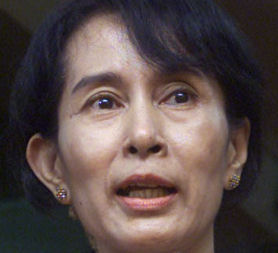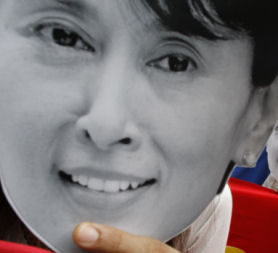Aung San Suu Kyi: ‘The Lady’ of Burma
Burma’s opposition leader Aung San Suu Kyi, has been released from house arrest in Burma, or Myanmar. Channel 4 News looks at her rise to lead National League for Democracy (NLD).

Aung San Suu Kyi, one of the world’s most famous political prisoners, has been detained for 15 out of the last 21 years. She was last freed in 2002.
Her release date come just days after the ruling military junta, under chairman of the State Peace and Development Council (SPDC) General Than Shwe, declared they had won the first elections in the country for 20 years – since Suu Kyi’s NLD won a landslide victory in 1990.
Suu Kyi said she “would not dream” of taking part in Burma’s elections and the NLD boycotted the vote, so the party was officially dissolved.
The 65-year-old Nobel laureate was due to be released on 27 May 2009, but just weeks before an American intruder swam to her home, where she was being held under house arrest.
The intruder, John Yettaw, claimed God had sent him to warn her that she would be targeted in an assassination plot. Suu Kyi was sentenced to house arrest the following August for allowing Yettaw to stay two nights.
Strange case of Suu Kyi and the night swimmer
The story of the unwanted visitor to the world's only Nobel laureate-political prisoner makes truly bizarre reading, wrote Foreign Correspondent Jonathan Miller at the time.
It's so weird, in fact, that it could really only happen in a country whose political manoeuvrings are stage-managed by a military junta.
Burma's "ministry of truth" appears to have fooled only the generals into thinking that everything's normal.
John William Yettaw, a 53-year-old US citizen, who's a Vietnam War veteran, a Mormon and a father of seven (and told Burmese exiles he was writing a book on "faith-based heroism") is a self-appointed crusader who's just made life a lot more difficult for Aung San Suu Kyi, who was 13 days short of her house arrest orders expiring.
Weirdest of all, it wasn't the first time he'd done this, it turns out. He'd apparently made a similar visit to the compound in November last year. On that occasion Ms Suu Kyi had informed her doctor (permitted one visit a month, as negotiated by a UN envoy), who told the police... who did nothing.
Aung San Suu Kyi spent much of her early life abroad. She was the daughter of General Aung San, who brought the country to the brink of independence from the British before he was assassinated in 1947.
She returned to the country in April 1988 to care for her mother, at the time that pro-democracy protests were spreading across the country. The long-term leader of the ruling party, General Ne Win, stepped down the same year, leading to mass demonstrations for democracy on 8 August 1988 in which up to 5,000 demonstrators were killed.
One month later the National League for Democracy (NLD) was established.
Suu Kyi was first placed under house arrest on 19 July 1989, where she remained for six years. Yet the following year the NLD won 392 of 485 parliamentary seats in the first election in the country for almost 30 years. Despite this, the military have not allowed her to take power.
Known simply as “The Lady” by millions of her countrymen, Suu Kyi is the widow of British academic Michael Aris, and has two sons, Alexander and Kim.
Aris died in 1999, but Suu Kyi turned down the opportunity to leave the country to go to his funeral, in the belief she would not be allowed back into the country if she did.
Factbox: Aung San Suu Kyi
- June 1945: Born in Rangoon (now Yangon)
- 1947: her father, General Aung San, was assassinated
- 1972: married British academic Michael Aris
- 1988: returned to Myanmar to care for her mother
- July 1989: first put under house arrest for "endangering the state"
- 1990: The NLD won the first election in the country for 30 years by a landslide 392 of 485 seats
- 1991: Awarded the Nobel Peace Prize
- Initially freed in 1995, and again in 2002

Aung San Suu Kyi was last freed in May 2002, when she was allowed to travel around the country speaking to supporters.
But a year later, on 30 May 2003, Suu Kyi and her convoy were reportedly ambushed, with rights groups saying they were attacked by military-affiliated thugs. She was blamed for the clashes and placed under “protective custody” in a secret location.
She was then moved back to her home on Yangon’s University Avenue after major surgery in September 2003, where she has been under house arrest ever since, without access to a telephone and restricted visitors.
In 2007, Burma saw the biggest anti-government protests since the 1988 uprising that led to Ms Suu Kyi going into Burmese politics.
The protests were originally a reaction to the ruling military junta’s hike in the price of fuel in August 2007, but a month later monks, who are highly revered in Burma, took part in protests after the military used force to break up a peaceful rally.
One rally symbolically marched past the home of Ms Suu Kyi, where she was under house arrest.
The junta, who initially let the monks protests continue, then started a violent crackdown on the protests.